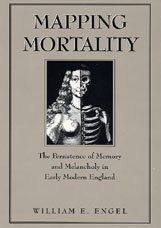MAPPING MORTALITY:
The Persistence of Memory
and Melancholy
in Early Modern England
(University of Massachusetts Press, 1995)
REVIEWS
"The strength of Engel's approach lies in its preoccupation with mortality and, by implication, death. [...] Engel implies that an aesthetics of mortality lurked beneath the surface of the skin, so to speak, in that fierce world in which the death of the literal body was life's greatest certainty." —George S. Rousseau, Bulletin of the History of Medicine 72.3 (1998), 543-45
"Combining the history of ideas with the history of consciousness in early modern Europe, Engel has produced a groundbreaking study that is boldly original, richly penetrating, and revolutionary in its implications. No student of early modern culture can afford to overlook this extraordinary work." — Arthur Kinney, Founding Editor English Literary Renaissance
"Engel has produced a rich and varied work, studded with brilliant insights about death, wit, and memory.... The style is fresh, lively, and invigorating." —Tom Conley, Lowell Professor of Romance Languages, Harvard University
"...as cleverly conceived as it is cleverly written. It rivets the attention...[and] will be remembered as a major contribution...[a] considerable addition to intellectual history." — L.R.N. Ashley, Bibliothèque d'Humanisme et Renaissance
58.3 (1996), 701-702
"...the novelty of Engel's approach is the rigour with which he argues his case for seeing all these large topics [mortality, memory, and melancholy] as closely interdependent for a range of writers." — Michael Bath, Review of English Studies
48.192 (1997), 534-35
"...a thoughtful and humane book..." — Robert Evans, Sixteenth Century Journal
27.2 (1996), 663
"Engel is a master teacher [whose] diction is striking, precise, and memorable."— Ward Allen, Sewanee Review
105.1 (1997), xx-xxii
JACKET BLURB
"...a combined philosophical and literary approach to intellectual history and the arts showing the extent to which Renaissance cognitive processes and symbol systems were mnemonic in both conception and application."
"...a combined philosophical and literary approach to intellectual history and the arts showing the extent to which Renaissance cognitive processes and symbol systems were mnemonic in both conception and application."
PUBLISHER'S DESCRIPTION
This book investigates the ways men and women in early modern England confronted, accommodated, and paid tribute to mortal life and certain death. Drawing on prose and poetry, painting and statuary, social practices and religious rites, Mapping Mortality reopens central questions about Renaissance habits of thought. It explores how the metaphors of that period signaled and enacted a continual revelation of mortality: the death of the body (figured as a kind of vehicle) and the eternality of the soul (that which was to be transported). The book argues that early modern metaphorics was essentially mnemonic and emblematic, grounding itself in the relation of body and soul. Building on the work of Benjamin, Heidegger, Derrida, Baudrillard, and Eliade, this book provides a key for recovering and understanding the critical assumptions underlying a mnemonically oriented principle of composition.


